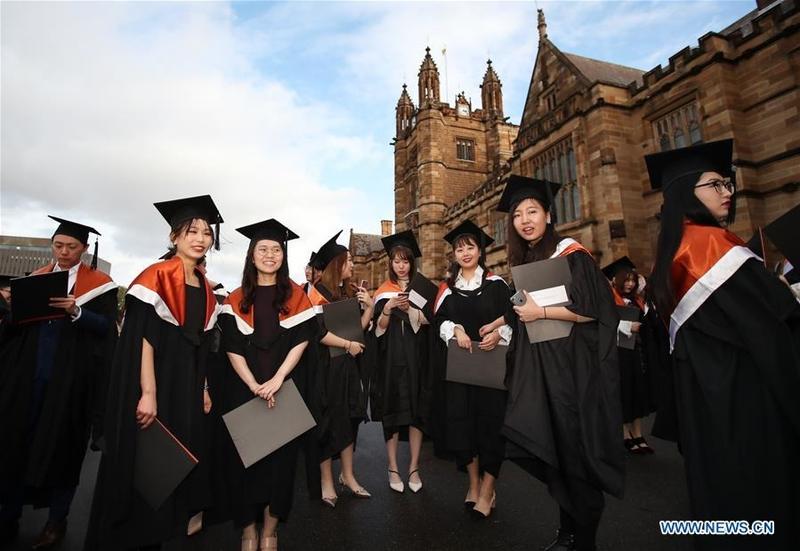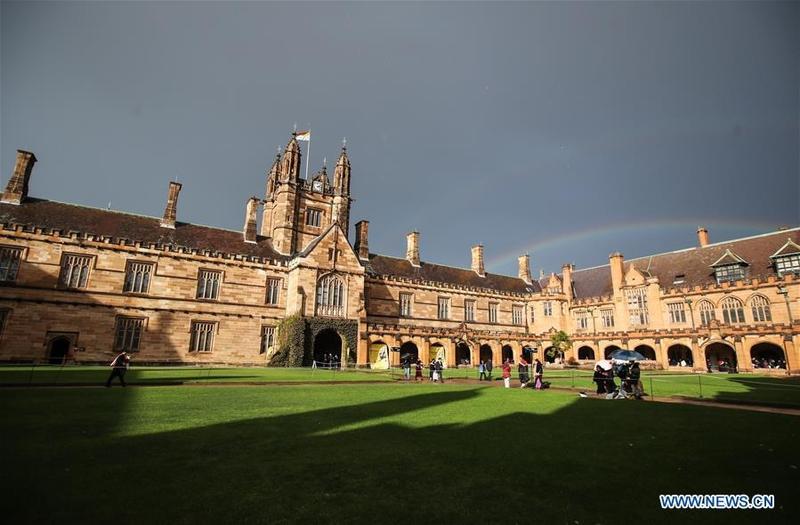 Graduates are seen at the campus of University of Sydney, Australia, June 5, 2019. (BAI XUEFEI/XINHUA)
Graduates are seen at the campus of University of Sydney, Australia, June 5, 2019. (BAI XUEFEI/XINHUA)
As the Australian government’s travel ban on Chinese enters its third week, universities around the country are bracing for the economic fallout with 100,000 students left stranded in China.
Even when the ban is lifted analysts say it will be a logistical nightmare to get the students back, settled in their classes and accommodated during the first semester of the academic year which starts next month for most universities.
READ MOVE: Envoy: Australia should ease travel ban on Chinese nationals
Prime Minister Scott Morrison announced on Feb 13 that his government would extend its entry restrictions on foreign nationals who have recently been in the Chinese mainland for a further week from Feb 15, “to protect Australians from the risk of coronavirus”.
The international education sector contributed about A$35 billion (US$23.5 billion) to Australia’s economy last year, making it the country’s most lucrative “export” after iron ore
The decision only added to the uncertainty in the country’s higher education sector already under growing pressure from its high fee-paying Chinese students. The international education sector contributed about A$35 billion (US$23.5 billion) to Australia’s economy last year, according to the Department of Foreign Affairs and Trade, making it the country’s most lucrative “export” after iron ore.
Chinese students, who make up more than one-third of the international cohort, account for 11 percent of enrolments at Australian universities, with some institutions relying on their tuition fees for nearly one-quarter of the revenue.
Analysts say that the sector will be hit financially but the extent will not be known until the travel ban is lifted.
Phil Honeywood, executive director of the International Education Association of Australia, was recently quoted by the Australian media as predicting the travel ban could cost universities up to A$8 billion in the worst-case scenario of Chinese students missing their first semester en masse.
An academic with one of Australia’s biggest universities, who did not want to be named, said that all students have till March 31 to withdraw from their courses “without penalty”.
 Chinese graduates are seen at the campus of University of Sydney, Australia, June 5, 2019. (BAI XUEFEI/XINHUA)
Chinese graduates are seen at the campus of University of Sydney, Australia, June 5, 2019. (BAI XUEFEI/XINHUA)
“The point is no one knows, with any degree of certainty, how many students will be pulling out and what the financial impact will be on the universities,” he said.
However, he said it is “easier said than done” for many of the students, many of whom are well into their second or final years, to just pack up and go to another university in the US.
“It is still too early to know the complete and detailed financial impact on universities,” said Catriona Jackson, chief executive of Universities Australia, the apex body for the sector representing 39 member universities. “It depends on how long the travel restrictions remain in place, and the mitigating effect of the flexible options each university offers to their students.”
ALSO READ: Chinese gymnasts pull out of World Cup due to travel ban
“Our universities are constantly mindful of diversification and risk management,” She said. “Universities are working hard to offer students who remain in China a range of options. These include postponing course start dates, delaying assessments, offering fee-free deferrals and being able to access course content online.”
Phil Honeywood, executive director of the International Education Association of Australia, predicted the travel ban could cost universities up to A$8 billion in the worst-case scenario of Chinese students missing their first semester en masse
The University of Sydney has one of the highest numbers of Chinese students enrolled. In 2019, Chinese students represented about 24 percent of the university’s total student body, or about 71,000.
“We understand from the federal government that around 14,000 of our students from China remain overseas,” a spokesperson for the university said.
“All units of study are set to begin on the first day of our semester (Feb 24) apart from our Master of Commerce and Master of Professional Accounting (courses) which have both been delayed for two weeks till March 9.
“For those students who are in China and unable to travel, we are working to enable remote study options for as many units as possible,” the spokesperson said.
In a statement the University of New South Wales in Sydney said up to 10,000 students are set to miss the start of term later this month but would be able to begin their studies in June instead.
The university said it had decided against offering online courses out of concern it would compromise the quality of tuition.
The University of Melbourne in a statement said, “We are striving to ensure a range of support measures are in place for students, including but not limited to flexible start dates, digital resources, catch-up arrangements, and deferrals for impacted students on a course-by-course basis.”
Macquarie University in Sydney said that 2,224 of its students are currently impacted by the travel restrictions. This is about 50 percent of its total Chinese students.
Chinese students are less than a third of the total international enrolments at Macquarie.
For students impacted by the travel ban “we have extended the last date to enroll in and commence a unit by one week until March 15,” the spokesperson said.
“We have also extended the last date to arrive on campus by three weeks until March 30 if online studies have been undertaken and extend the census date until April 3.”
A spokesperson for Monash University in Melbourne said the health and well-being of its students is “our priority”.
Monash has already deferred the start of semester for the majority of programs until March 9 for an online program and March 16 for an on-campus start.
Other universities, such as Griffith University in Brisbane, offer options such as deferral and leaves of absence.


